Back to the list
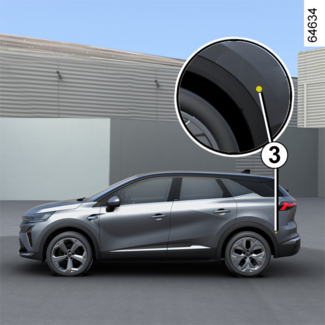
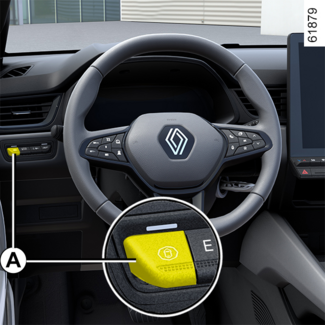
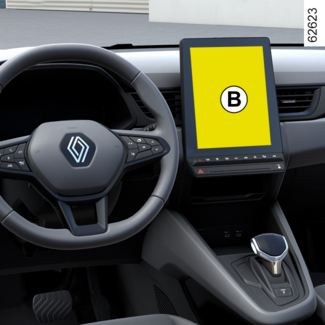
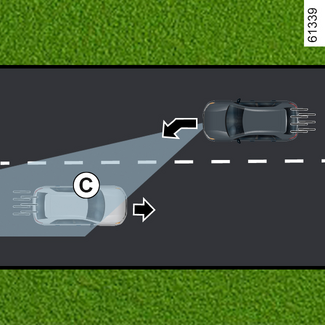
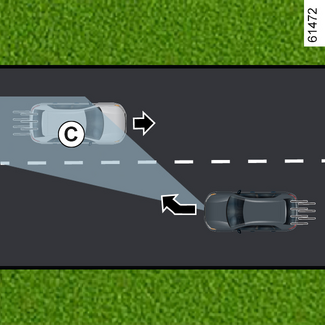
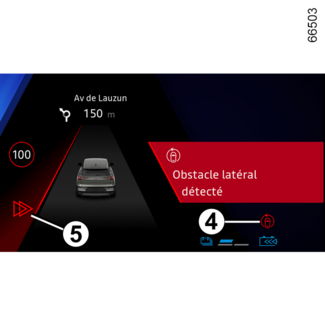
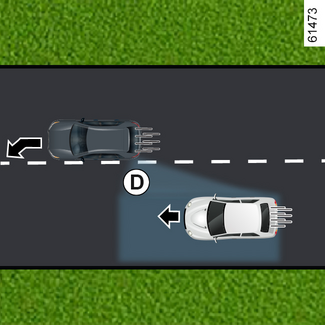
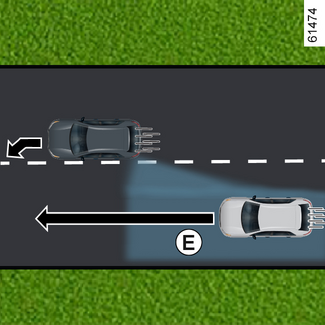

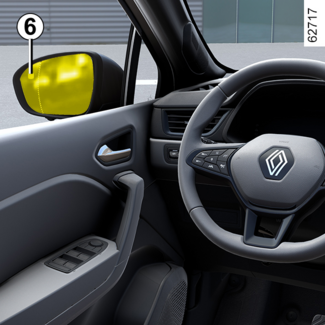
Emergency lane departure prevention
Emergency lane departure prevention


Using information from the radar 2 and the camera 1, the function triggers corrective action on the vehicle steering system in the event
of a risk of collision with a vehicle coming from the opposite direction in the adjacent
lane, without the direction indicator having been activated.
Depending on the vehicle, using information from the radars 3 and the camera 1, the function triggers corrective action on the vehicle steering system in the event
of a risk of collision with a vehicle moving at the same speed or at a higher speed,
if within the detection area of the rear radars.
Tip
You can retake control of the vehicle at any time by operating the steering wheel.
WARNING
This system provides an additional driving aid.
This system is not, under any circumstances, intended to replace the due care and
attention of the driver, who should at all times be in control of the vehicle.
Location of the camera 1
Make sure the windscreen is not obscured (by dirt, mud, snow, condensation etc.).
Location of the front radar 2
Ensure that the radar area is not obstructed (dirt, mud, snow, a badly fitted/attached
front number plate), impacted, modified (including paintwork) or hidden by any accessory
fitted on the front of the vehicle (on the front bumper, logo, etc.)
Location of the side radars 3
Ensure that the radar area is not obstructed (by dirt, mud, snow etc.), impacted or
modified (including paintwork etc.).
Activating/deactivating the function
From the A "My Safety" switch

Press switch A twice if the function has been disabled from the "Custom" mode of the "My Safety"
function MY SAFETY.
To reactivate the function, press the Aswitch.
From the B multimedia screen

Please refer to the multimedia instructions for more information.
Detection of an oncoming vehicle


When driving at a speed between approximately 40 mph (65 km/h) and 68 mph (110 km/h),
if there is a risk of collision with a vehicle coming from the opposite direction
in an adjacent lane and within the detection zone C, without the direction indicator having been activated, the system:
- warns you of a collision risk:

The message "Risk of collision" is displayed on the dashboard accompanied by the indicator
4 in red, the line on the side of the intervention and an audible signal. Display 5 appears on the instrument panel on the side of the intervention;
and
- triggers corrective action on the steering system.
Tip
You can interrupt the trajectory correction at any time by moving the steering wheel.
WARNING
This function is an additional driving aid.
This function is not under any circumstances intended to replace the due care and
attention of the driver, who should at all times be in control of the vehicle.
The function may not activate if the approaching speed is greater than approximately
124 mph (200 km/h) (for example, you are travelling at 68 mph (110 km/h) and the vehicle
is travelling in the opposite direction in the adjacent lane at 56 mph (91 km/h).
If case of overtaking
(depending on the vehicle)




While driving at a speed over 40 mph (65 km/h), when approaching a line (continuous
or broken) and there is a risk of collision with a vehicle located in the blind spot
D and it is moving in the same direction as your vehicle or with a vehicle that is
rapidly approaching from behind in an adjacent lane that is in the detection area
E, the system:
- warns you about a risk of collision: the warning light 6 flashes, the message "Lateral obstacle detected" is displayed on the instrument panel, accompanied by the indicator 4 in red, the line on the side of the intervention and an audible signal. Display 5 appears on the instrument panel on the side of the intervention;
and
- triggers corrective action on the steering system.
Temporarily not available / non-activation of the system
The system is temporarily unavailable or disabled when:
- very fast lane departure;
- driving continuously on a line;
- approximately four seconds after changing lanes;
- tight bends;
- impaired visibility;
- activation of the direction indicator light (only when an oncoming vehicle is detected in an adjacent lane);
- activating the hazard warning lights;
- strong acceleration;
- the vehicle speed is greater than approximately 99 mph or 112 mph (160 km/h or 180 km/h), depending on the vehicle;
- the lane width changes;
- operation of the electronic stability control (ESC);
- operation of the anti-lock braking system;
- operation of the active emergency braking system;
- ...
The system cannot be activated when:
- the camera does not detect a line (solid or broken) on the relevant side of the vehicle;
- the camera does not simultaneously detect the two boundaries of the lane in which your vehicle is moving;
- reverse gear is engaged;
- the field of vision of the camera is obstructed;
- the front radar is obscured;
- depending on the vehicle, the rear radars are obscured;
- ...
Depending on the vehicle, if one of the side radars is obscured the message "Side radars no visibility" will appear on the instrument panel.
When the front radar is obscured, the "Front radar no visibility" message is displayed on the instrument panel.
When the front camera is obscured, the "Front camera no visibility" message is displayed on the instrument panel.
Clean the area where the sensors are located.
Automatically deactivating the function
The system is automatically deactivated when:
- the electronic stability control (ESC) is deactivated or malfunctions;
- the anti-lock braking system is malfunctioning;
- A towbar is electrically connected to the trailer hitch socket;
- the
warning light is displayed.
If the vehicle is equipped with a towbar that is recognised by the system, the message
"Trailer: side radars unavailable" is displayed to inform you that the emergency lane departure prevention function
has been deactivated.
If the vehicle is towing a trailer or caravan, unexpected or unnecessary corrections
may occur. You can deactivate the system to avoid unexpected or unnecessary corrections.
Operating faults
When the function detects an operating fault, the following messages may be displayed
on the instrument panel:
- « Check Front camera » ;
or
- « Front radar to check » ;
or
- « Check Driving assist » ;
or, depending on the vehicle,
- « Check Side radars ».
Consult an approved Dealer.
Warnings
WARNING
This function is an additional driving aid. This function is not under any circumstances
intended to replace the due care and attention of the driver, who should at all times
be in control of the vehicle.
System servicing/repairs
- In the event of an impact, the alignment of the camera or radar(s) may be altered and its operation may consequently be affected. Deactivate the function and consult an authorised dealer.
- Any work in the area where the camera or radars are located (replacements, repairs, windscreen modifications etc.) must be carried out by a qualified professional.
Only an authorised dealer is qualified to service the system.
In the event of system disturbance
Some conditions can disturb or damage the system's operation, such as:
- windscreen obscured (by dirt, ice, snow, condensation etc.);
- a complex environment (tunnel, etc.);
- poor weather conditions (snow, rain, hail, black ice, etc.);
- poor visibility (night, fog, etc.);
- multiple road markings (roadworks, etc.) ; the road lines are irregular or difficult to distinguish (e.g. partially erased markings, excessive spacing, uneven road surface, etc.);
- being dazzled (glaring sun, lights of vehicles travelling in the opposite direction; etc.);
- the road is narrow, winding or undulating (tight bends, etc.);
- closely following a vehicle travelling in the same lane.
In this case, the "lane departure prevention" function may be activated incorrectly
or not at all.
Risk of unwanted, incorrect correction or no correction of trajectory.
Deactivating the function
You must deactivate the function if:
- the camera area (on the windscreen side or the interior rear-view mirror side) or radar area(s) have been damaged;
- the road is slippery (snow, black ice, aquaplaning, gravel etc.) ;
- the windscreen is cracked or distorted (do not carry out windscreen repairs in this area; have it changed by an approved dealer);
- the vehicle is towing a trailer or a caravan;
- the vehicle is being towed (breakdowns);
- you are not driving on a paved road.
